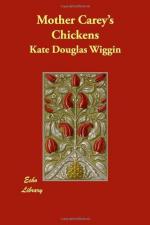“Glad to hear it! A delightful fellow, and straight as a die. I only wish he could perform once in a while, instead of promising.”
“He will if only he keeps his health, but he’s heavily handicapped there, poor chap. Well, what’s the verse?”
The Admiral put on his glasses, prettily assisted by Kathleen, who was on his knee and seized the opportunity to give him a French kiss when the spectacles were safely on the bridge of his nose. Whereupon he read:—
“There came to port last Sunday
night
The queerest little craft,
Without an inch of rigging on;
I looked, and looked, and
laughed.
“It seemed so curious that she
Should cross the unknown water,
And moor herself within my room—
My daughter, O my daughter!
“Yet, by these presents, witness
all,
She’s welcome fifty
times,
And comes consigned to Hope and Love
And common metre rhymes.
“She has no manifest but this;
No flag floats o’er
the water;
She’s rather new for British Lloyd’s—
My daughter, O my daughter!
“Ring out, wild bells—and
tame ones, too;
Ring out the lover’s
moon,
Ring in the little worsted socks,
Ring in the bib and spoon."[1]
[Footnote 1: George W. Cable.]
“Oh, Peter, how pretty!” said Mother Carey all in a glow. “You never showed it to me!”
“You were too much occupied with the aforesaid ‘queer little craft,’ wasn’t she, Nan—I mean Nancy!” and her father pinched her ear and pulled a curly lock.
Nancy was a lovely creature to the eye, and she came by her good looks naturally enough. For three generations her father’s family had been known as the handsome Careys, and when Lieutenant Carey chose Margaret Gilbert for his wife, he was lucky enough to win the loveliest girl in her circle.
Thus it was still the handsome Careys in the time of our story, for all the children were well-favored and the general public could never decide whether Nancy or Kathleen was the belle of the family. Kathleen had fair curls, skin like a rose, and delicate features; not a blemish to mar her exquisite prettiness! All colors became her; all hats suited her hair. She was the Carey beauty so long as Nancy remained out of sight, but the moment that young person appeared Kathleen left something to be desired. Nancy piqued; Nancy sparkled; Nancy glowed; Nancy occasionally pouted and not infrequently blazed. Nancy’s eyes had to be continually searched for news, both of herself and of the immediate world about her. If you did not keep looking at her every “once in so often” you couldn’t keep up with the progress of events; she might flash a dozen telegrams to somebody, about something, while your head was turned away. Kathleen could be safely left unwatched for an hour or so without fear of change; her moods were less variable, her temper evener; her interest in the passing moment less keen, her absorption in the particular subject less intense. Walt Whitman might have been thinking of Nancy when he wrote:—




